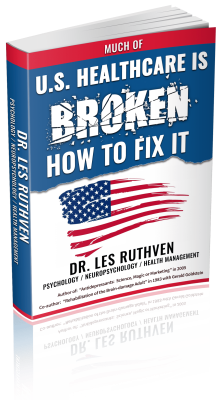Last updated on January 6th, 2024 at 08:33 am
By: Leslie (“Les”) Ruthven, Ph.D.
Email: dr.les.ruthven@gmail.com
Health blog: www.ruthvenassessment.com
As I write this I know about the above only from newspaper reports and television news that light headedness apparently from the senator’s previous episodes of depression initiated the hospitalization for treatment of the senator’s depression. We also know from the media that while running for a senate seat in Pennsylvania Mr. Fetterman had a left temporal stroke to account for his language processing difficulties which have abated to some degree in the interim.
From the history of psychiatry and the pharmaceutical industry since the 1950s I am concerned that the senator’s hospitalization will unfortunately reflect the generally accepted and conventional wisdom that depression is a brain disease, a chemical imbalance in the brain, and that psychiatric drugs are the chief means of restoring the brain’s “normal balance”. In the past as a clinical psychologist I treated a variety of patients with depression but I never encountered light headedness as a symptom of depression but could the light headedness be from another source, perhaps the drugs themselves?
From the senator’s several episodes of depression in the past, especially if he was treated with psychiatric drugs, did his psychiatrist make a diagnosis of treatment resistant depression (TRD) for the senator’s continuing depression following drug treatment? If the senator as an outpatient has not been treated for TRD will the senator be treated for TRD in the hospital with either antipsychotic medication, electroconvulsive therapy (ECT) or perhaps one of the FDA approved hallucinogenic medications for treating TRD?
What is TRD and why has this diagnosis come about?
Since psychiatry has defined depression as a brain disease the accepted “theory”, after the advent of Prozac in 1987, was that the source of the disease was the depletion of serotonin in the brain. The theory was revised when research found that other brain neurotransmitters in addition to serotonin may also be involved in clinical depression. The concept of TRD came about because two thirds of antidepressant treated depressed patients, although some better, continue to have depressive symptoms. Psychiatry, Big Pharma and the medical device industry began to look for add on treatments when drugs fail to take the patient to remission. In psychiatry there were already a dozen add on treatments such as electro convulsive therapy (ECT), vagal nerve surgery, lobotomy and others when antidepressants failed to remit the patient’s depression. Many of those earlier add on had several negatives to them (e.g., destroying parts of the brain and memory problems) and the psychiatric industry looked to new add on treatments including modern day antipsychotic medications, several modified hallucinogenic drugs and a dozen bio mechanical treatments that in one way or another zap the brain to hopefully give relief and perhaps further symptom reduction. If the senator has not been treated for TRD already he is very likely to be exposed to add on treatment in the future.
Could it be that it is not the senator’s depression as the cause for his light headedness and failure to respond to drug treatment? As an alternative explanation I suspect the drug treatment itself may be the cause for the senator’s failure to improve?
First, according to the sound research there is no evidence that depression is a brain disease and attempts to manipulate brain chemistry with drugs and bio mechanical devices have proven not to bring about remission since the add on treatments are only a little better than inert placebos in reducing depressive symptoms. Moreover, antidepressant drugs are non-habituating and brain impairing addicting drugs. If the senator’s drug treatment history for his depression is anything like I suspect a very good case can be made for drug tapering to find out who is the real senator Fetterman without all of the drugs’ adverse side effects. If his psychiatrist in the hospital is committed to the conventional wisdom of psychiatry, and not the available sound research, I suspect the psychiatrist will continue to look to brain chemistry as the source of the senator’s failure to respond to the standard of care treatment for the senator’s depression.


